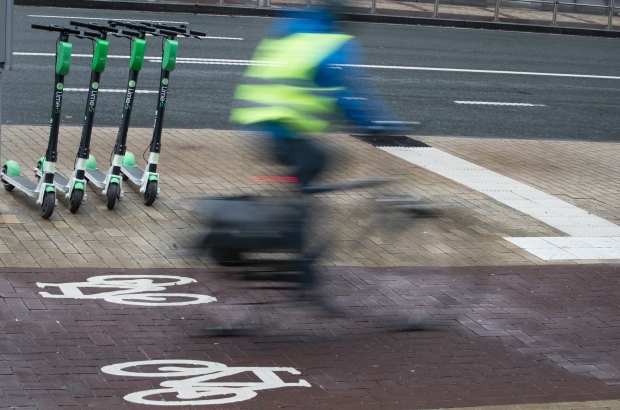- Daily & Weekly newsletters
- Buy & download The Bulletin
- Comment on our articles
Scooter firms win court case to continue operating in Brussels
Scooter operators Lime and Voi have temporarily been allowed to continue operating in the Belgian capital following a favourable verdict from the Brussels courts.
When the region moved to limit the number of scooter rental companies operating in the city to just two and called for a public tender - with Bolt and Dott emerging victorious - the other operators missed out.
Lime and Voi lodged an appeal with Brussels Mobility, the regional mobility authority, as well as an interim injunction with the Court of First Instance, claiming their previous licences allowing them to operate in Brussels remain valid until 3 July for Lime, and until 23 August for Voi. The court agreed.
“As a result, from 1 February, all Lime vehicles, scooters and bicycles, will continue to be available to the people of Brussels in a perfectly legal manner,” said a spokesperson for Lime.
Uber is a major stakeholder in Lime, and Marie Thibaut de Maisières, spokeswoman for Brussels mobility minister Elke Van den Brandt (Groen), said the lawsuit was not unexpected.
“It’s not so surprising on the part of Lime, given that Lime belongs to Uber and that Uber has always, and in every country, had a strategy of legal attacks, lobbying and legal exhaustion to destroy the legislation of countries, regions and states,” de Maisières said.
The proliferation of rental scooters – often abandoned haphazardly in public spaces – has resulted in pushback from a number of cities, including Paris which banned them altogether.
Faced with mounting complaints about the nuisance of scooters, Brussels adopted a regional decree last July regulating "the use of self-service shared transport as an alternative to the car".
It was decided to limit the number of companies offering scooters in the capital to just two, with a maximum of 4,000 scooters each for a total of 8,000. The original call for tenders for the two licences saw 27 applications from 15 operators before Bolt and Dott were selected.
The Brussels framework also provides for three operators (Bolt, Dott and Voi) for shared bicycle services, with a maximum of 7,500 bicycles in circulation. Felyx and Go Sharing have been appointed to run self-service mopeds (600 units) and Tier and Pony share the cargo bike market (maximum 300 cargo bikes).
The idea of imposing limits is to avoid the chaos of scooters scattered everywhere, posing impediments to safety and all types of traffic. Designated parking zones are also being implemented across the region.
Van den Brandt’s office said it was “very disappointed” by the court's decision to allow Lime and Voi to continue offering their scooters in spite of these regulations.
“The request to limit the number of operators came from the operators themselves,” a spokesperson for the office said.
“We are going to fight to maintain a limit on the number of scooters in Brussels, because this is essential to maintain a high-quality public space that is safe for pedestrians and people with reduced mobility.”
It is not yet known whether the verdict will also allow other operators that missed out to resume putting their scooters up for rent on Brussels pavements.
“I have to admit that we are very disappointed because we consulted the operators extensively, particularly before launching the call for tenders,” minister Van den Brandt told the mobility committee of the Brussels parliament.
"They all agreed that the number of scooters in Brussels had to be limited, and they all undertook to play the game ethically. And most of the operators have done so in good faith, for which I thank them.
"We will, of course, do our utmost to defend our reform of the scooter sector, which is essential for pedestrians and people with reduced mobility in particular, in the face of this legal guerrilla warfare."
Photo: Benoît Doppagne/Belga

















